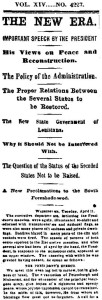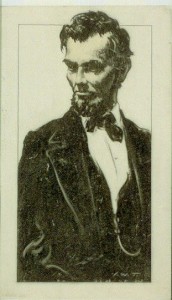After the April 9th surrender of General Lee’s Army of Northern Virginia, President Lincoln sure wasn’t looking for any triumphal celebrations or even resting on his laurels. He told a crowd on April 10th he would deliver a speech the next day. He spent the rest of that day catching up on business after his recent time at City Point but mainly focused on reconstruction. He told his cabinet he didn’t have any time to celebrate because he now had the enormous job of putting nation back together again. “He had to build and restore the conquered South, maintain the loyalty of white Unionists there, protect Negro freedom, and contend with an increasingly hostile Congress.” His speech the next day was going to explain the problems and his plans for reconstruction.
On the night of April 11, hundred[s] of people assembled on the White House lawn, as Lincoln prepared to address them from an upstairs window. It was misty out, but even so one could see the new illuminated dome of the Capitol. Off in the distance, across the Potomac, Lee’s Arlington plantation was aflame with colored candles and exploding rockets, as hundreds of ex-slaves sang The Year of Jubilee.” With [Noah] Brooks holding a candle from behind a curtain, Lincoln stepped to the window and enrolled his speech. Stretched out below, Brooks noted, “was a vast sea of faces, illuminated by the lights that burned in the festal array of the White House.”
Here’s a bit from The Papers And Writings Of Abraham Lincoln, Volume Seven:
LAST PUBLIC ADDRESS,
APRIL 11, 1865
FELLOW-CITIZENS—We meet this evening not in sorrow, but in gladness of heart. The evacuation of Petersburg and Richmond, and the surrender of the principal insurgent army, give hope of a righteous and speedy peace, whose joyous expression cannot be restrained. In the midst of this, however, He from whom blessings flow must not be forgotten.
A call for a national thanksgiving is being prepared, and will be duly promulgated. Nor must those whose harder part gives us the cause of rejoicing be overlooked. Their honors must not be parceled out with others. I myself was near the front, and had the pleasure of transmitting much of the good news to you. But no part of the honor for plan or execution is mine. To General Grant, his skillful officers, and brave men, all belongs. The gallant navy stood ready, but was not in reach to take active part. By these recent successes, the reinauguration of the national authority—reconstruction which has had a large share of thought from the first, is pressed much more closely upon our attention. It is fraught with great difficulty. Unlike a case of war between independent nations, there is no authorized organ for us to treat with—no one man has authority to give up the rebellion for any other man. We simply must begin with and mould from disorganized and discordant elements. Nor is it a small additional embarrassment that we, the loyal people, differ among ourselves as to the mode, manner, and measure of reconstruction. As a general rule, I abstain from reading the reports of attacks upon myself, Wishing not to be provoked by that to which I cannot properly offer an answer. In spite of this precaution, however, it comes to my knowledge that I am much censured for some supposed agency in setting up and seeking to sustain the new State government of Louisiana. … [Much about Louisiana’s readmission to the Union and a bit about voting rights for blacks]… Such exclusive and inflexible plan would surely become a new entanglement. Important principles may and must be inflexible. In the present situation as the phrase goes, it may be my duty to make some new announcement to the people of the South. I am considering, and shall not fail to act, when satisfied that action will be proper.
“There was patter of polite applause, but it was obvious that most of the audience was extremely disappointed in the speech.” They wanted a victory oration, not the technicalities of reconstruction. Some were annoyed about limited black suffrage. Many left during the speech.
I copied this from With Malice Toward None, and it squares pretty well with David Herbert Donald’s Lincoln. Mr. Donald added that during the speech as the President “finished each page, he dropped it to the floor, where Tad scrambled about, collecting them and, growing restless, importuned his father for ‘another.'”[1]
- [1]Oates, Stephen B. With Malice Toward None. New York: New American Library, 1977. Print. page 459-460; Donald, David H. Lincoln. London: Jonathan Cape, 1995. Print. pages 582.↩


